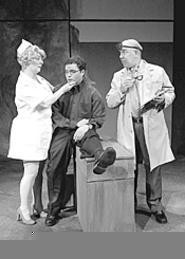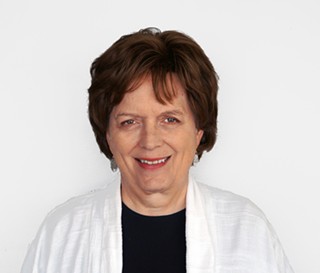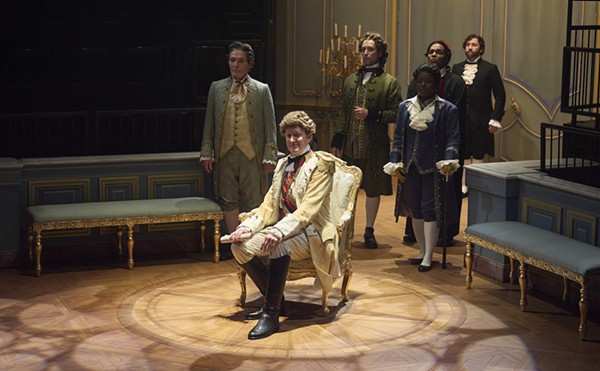This cultural curiosity is engaged with refreshing directness by David Ives in Polish Joke, now at Beck Center. Through a collection of nonlinear scenes, we follow the travails of Jasiu, an unhappy young man of Polish descent, who's trying to duck his heritage and achieve the American dream, even though his surname ends in "ski." At times outrageously funny, thanks to a clever script and some fabulous mini-characters developed by a talented cast, the play ultimately tries too hard to have it both ways: laughing at the Polacks who live in the joke world while honoring Polish people and traditions in the real world.
It begins with nine-year-old Jasiu learning at the knee of his Uncle Roman that all Polish jokes are true, citing a fellow in their predominantly Polish neighborhood who built a garage, only to have it collapse with him inside. "Good thing he was Polish, 'cause if he'd built it right, he'd be dead." Roman also shares some amusing insights about other nationalities, including the Irish ("They aren't smart, but they're crafty") and Latvians ("They're all effeminate, except the women").
From there, the play careens from one detached sketch to another, as Jasiu plays dodgeball with the accusation and/or self-realization of being Polish. Some of these set pieces are hilarious, such as his job interview with Portia Yale, a loony human-resources administrator with a squirrelly laugh and an obsession with, of course, nationalities. Then there's the Polish family that tunneled from the old country to America, with their car in tow, only to find they could have flown over. And the nice Jewish girl, Rachel, whom Jasiu dates but can't settle down with, because he's intent on moving to Ireland and burying his personal past forever.
Through all these scenarios, playwright Ives demonstrates his dazzling gift for sharp, startlingly offbeat comedy. In a fairly straightforward scene between Jasiu and the priest at his Catholic high school, the father laments our hero's decision to abandon his calling to the priesthood, wistfully commenting, "I was looking forward to you and me singing The Mikado Saturday evenings in the rectory." And a scene in an Irish travel agency soaks up every dram of clichéd blarney, as the owner, Mr. O'Flanagan, joyously reels off a series of richly embroidered similes in a lilting brogue: "That makes my heart flop like a fresh-caught salmon dropped into a basket at 6:15 p.m. on a Tuesday." Then he's matched by his wife, who observes, "I feel as fine as the first good fart after a plate of cooked cabbage."
The laughter gets mired down, however, when Jasiu's flight to the Emerald Isle is diverted to Warsaw, where he is lectured on his lack of Polish pride by Olga, a cute airline clerk. Smitten, although we know not why, Jasiu decides to marry Olga and settle down in Poland, of all places. This forced resolution to a crisis of self-acceptance is heavy-handed and not terribly funny -- a bad combination, what with all that has gone before. And the last scene, when Jasiu comes back to see a dying Uncle Roman, is an awkward reach for sentiment.
But it's worth attending Polish Joke just to witness the stellar cast, under the adroit direction of Jerrold Scott. Sheila E. Maloney is a scream in all her roles. Working under a series of wigs, she's a hoot as a Jewish yenta, as the gassy Mrs. Flanagan, and as the daft Portia, among others. Equally entertaining is Leslie Feagan, who essays six variously loopy folks, including Uncle Roman, without becoming too cartoonish. Slim and tiny Kim Weston, playing Rachel and Olga, has perhaps the largest stage presence. Indeed, her brief appearance as the underground immigrant Zosia is a study in how to steal a scene with virtually no lines or stage time -- her look of hopeful innocence is priceless. Playing four parts, including dead Polish hero Tadeusz Kosciuszko, John Busser holds his own in this fast company. Anchoring the proceedings is earnest Greg Wenz in the straight-man role of Jasiu, and he is a perfect foil for the wackos he encounters.
Although Ives' play does not deliver the message about mutual tolerance to which it apparently aspires, it's a wild comic ride while it lasts. And that's no joke.













